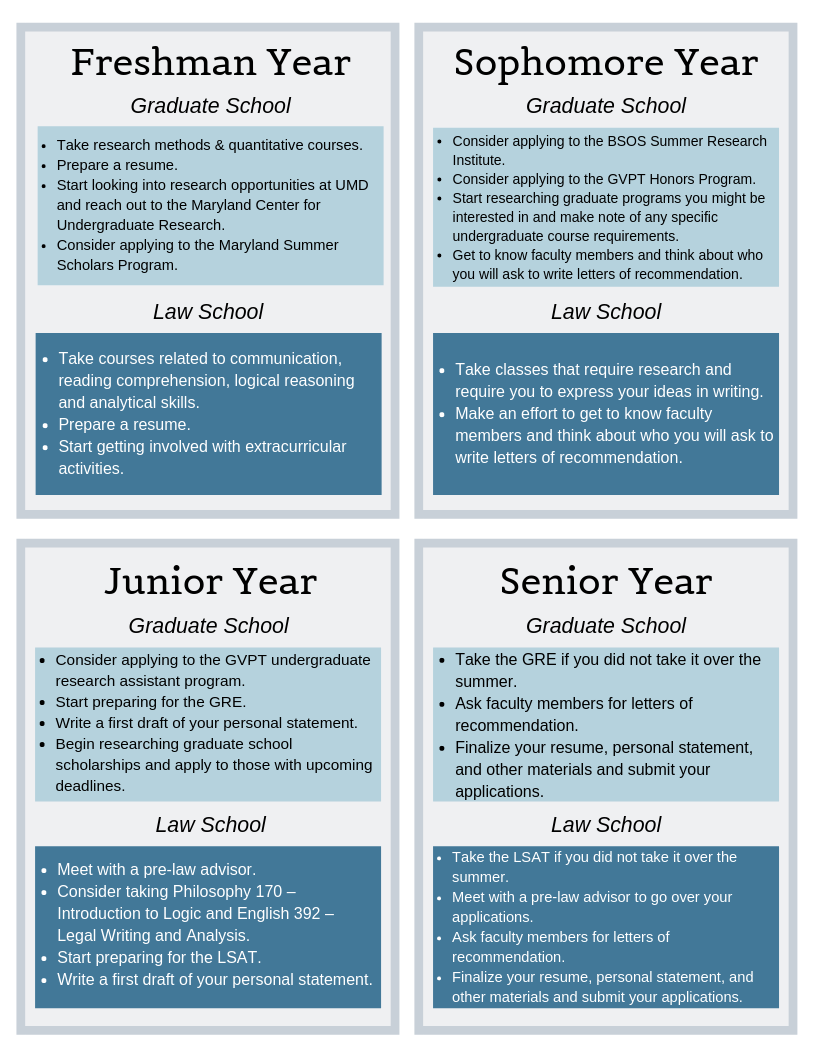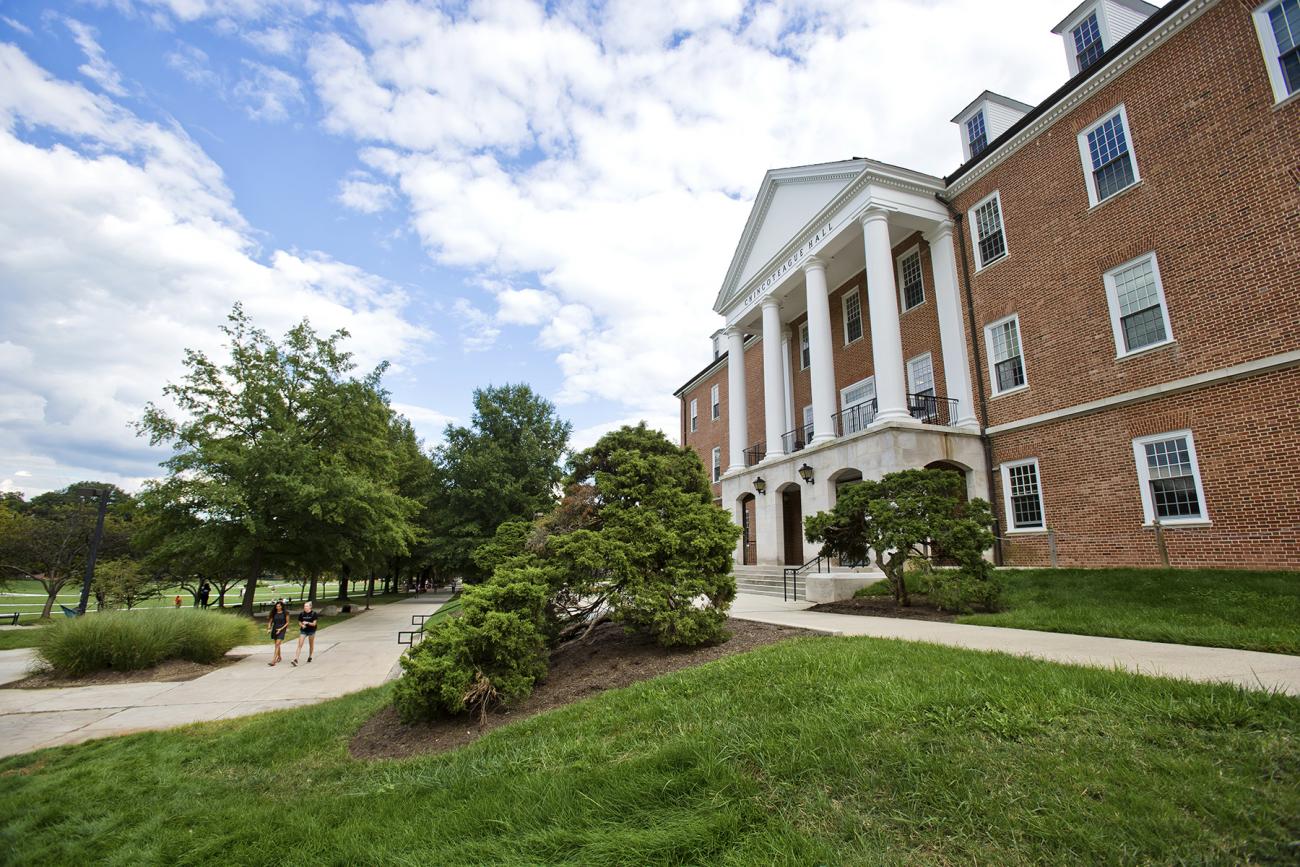Preparing for Graduate School
Faculty members are an invaluable resource about graduate school. They can advise you about the specialties of different schools, which schools are most likely to admit you, what you can do with the graduate education you are considering, etc. Remember, it is never too early to get to know professors who teach classes you enjoy!
The Feller Center in BSOS also has resources for graduate school preparation.
Graduate School Prerequisites
Prerequisites for admission to graduate school in the political science or public policy fields will vary, but many schools require students to have taken college courses in calculus, microeconomics, macroeconomics, and advanced level foreign language before attending. Please note that some schools will not accept AP credit for these prerequisites. Students are strongly encouraged to begin researching graduate schools of interest early on, and most of this information can be found on individual school websites.
Note: Students may not earn duplicate credit for the same course; if students opt to take a course for which they previously earned AP/IB credit, they will be required to forfeit the AP/IB credit.
The GRE
The Graduate Record Examination is the entrance exam for graduate school. "The GRE is to graduate school what the SAT is to college." The exams are formatted similarly; both have a verbal, math, and writing section. In some cases, schools you are applying to will require you to take the subject part of the GRE in addition to the rest of the exam. The scores needed will depend on both the school and your area of interest (i.e. International Relations, Public Policy). You should also note that certain programs do not require you to take the GRE for entry, although most do.
If you plan on attending graduate school the fall semester following your May graduation, take the test no later than December of your senior year. Tests taken after that date will not be scored in time for your applications to be processed by the programs to which you’ve applied.
If you take the test more than once, most universities will look at your best scores in deciding upon your admission. Some schools will look at your scores from all three sections, and some will focus on just two of the three; however, the scores for ALL sections will be sent to the universities you specify.
For more information on the GRE and how to register for a test date, you should visit the GRE website.
Application Process
The most important thing to consider before applying to graduate school is whether or not pursuing an advanced degree is the best personal decision for you. Professional and graduate degree programs are an investment of time and money and are usually used as stepping stone for a specific academic or professional goal. You should be looking primarily at schools with strong programs that are a good fit for you both academically and financially. You also want to take a look at the faculty members who are a part of the department, as you will more than likely be working closely with them in classes and in research. PhD graduate students have very close contact with their professors and often publish articles or books with them.
Be sure that your applications are complete before sending them to prospective universities and ensure that all application materials will arrive before the application deadline. Your graduate school application is evaluated on many factors. While your undergraduate GPA and GRE scores are important, your letters of recommendations and personal statement are also very important in determining your admission. A good resource for writing a personal statement for graduate school can be found here.
Based on the merits of your application, many schools may offer you an assistantship or fellowship. If you are planning to be a full-time graduate student you should check the box on your application that asks if you want to be considered for these awards. There are two kinds of assistantships - one is research and the other is teaching. Both assistantships require you to work approximately 20 hours per week. A fellowship involves no work commitment. Both assistantships and fellowships usually come with tuition remission as well as some type of salary for the 20 hour/week work commitment. This may vary from school to school, so you should take this into consideration when searching out programs.
Graduate School Experience
What should you expect from graduate school? Graduate classes are small, seminar-style courses, much like the upper-level seminars in this department. Often, the professors present ideas from the assigned readings for the students to discuss, rather than lecture. Usually there is a large amount of reading required, but what your courses require of you will vary from program to program.
If you are pursuing a PhD or a research-based Master's there are often opportunities for students to publish or present articles with their professors; this is a great way to get your name out into the field by being associated with a more well-known scholar in the field. Graduate students are usually encouraged to get involved with research and publishing.
If you have any additional questions about the requirements of a specific graduate school, you should visit that school’s website or contact the graduate program’s admissions office. If you have more general questions about graduate school, feel free to ask your teaching assistant, a faculty member, the Director of Undergraduate or Graduate Studies in the department, or your GVPT advisor.
Links for Pre-Law Advising
University of Maryland Pre-Law Advising Office
University of Maryland MLAW Programs
Graduate and Law School Planning Timeline
The timeline below provides guidelines for some key tasks that should be completed each year of your undergraduate career to prepare you for applying to graduate school or law school.



